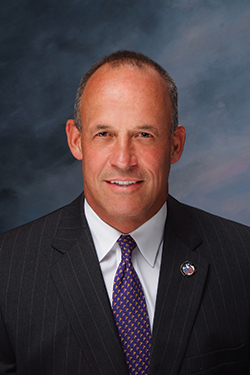
A new city manager recently took over the reins of Peoria’s city government when Scott Moore became the 15th individual to serve as our chief administrative officer. Peoria adopted the council/manager form of government in 1952, and it is no surprise that our first city manager, George Bean, became one of the giants in the profession throughout his long career. I have no doubt that Scott Moore will continue that proud tradition that has served our community so well.
When you look at his experience and success in Austin, Texas, and Ellsworth and Wichita, Kansas, you will recognize that the City Council recruited the right man at the right time. With a deep background in finance and budgeting, highly diverse operational responsibilities, and a proven track record in long-term planning, economic development and intergovernmental relations, Scott has been able to hit the ground running.
While he has the needed experience and technical depth, Scott also brings an engaging personality, appreciation for staff, understanding of council-manager relationships and a passion for community involvement. His not-so-secret “weapon” is his equally talented and charming wife, Tammy, a respiratory therapist and professional in her own right. They share a common love of cooking and have raised two grown daughters together. Scott and Tammy are a wonderful addition to Peoria, and we welcome them heartily.
Also “welcoming” Scott will be a host of substantive issues. He would be the first to tell you that one of the reasons he accepted this position is the opportunity to demonstrate his skill and work collaboratively to solve serious challenges. Peoria is not the largest city with the council/manager form of government—that distinction belongs to Phoenix—but we are certainly a microcosm of the American urban community. If you can “manage” Peoria, you can administer just about any municipal corporation in the country.
What are some of the challenges he faces right off the bat? Front and center is the budget for 2010 and beyond. Before Scott arrived, our administrative team made great progress in addressing the $10 million gap in 2010’s budget and identified areas needing attention for the next several years. As I’ve previously noted, Peoria’s government will be smaller in the future. It will require realignment of staff resources with critical services and available revenues. This issue alone will occupy a majority of his time.
The next big-ticket item is the Combined Sewer Outflow (CSO) project. This hasn’t been in the public’s eye recently, as pressing budget matters pushed it off the “front page.” Yet 2010 will be a critical year as the City’s plan will be approved—a plan which comes with an incredible price tag ranging from $100 million to more than $200 million. Financing such a mammoth project, as well as overseeing design and construction, is a daunting task. Based on Scott’s experience in Wichita, he will be up to the task.
Top priorities also include exploring service-sharing opportunities with other units of local government, particularly Peoria County. The City and County face similar financial problems and serve a largely common constituency. As you look around the country, you see many examples of service sharing, and even combination in some cases. The City Council, through the leadership of Council members Jacob and Spears, has made this an important long-term necessity for the city manager’s team.
Closely related to all of the above is rethinking the structure of city government. The number of direct reports to the city manager’s office is simply too large in an era of budget and revenue shortfalls. Everyone recognizes that reinventing city government cannot be done overnight, but we are running out of time to make essential structural changes in light of projected deficits. A brief look at Scott’s experience in Wichita is reason for optimism, as he has been the “go-to” man in similar situations.
Hand in hand with reorganization is optimizing staff resources and developing “bench strength”—succession planning—as the age of our workforce continues to advance. Peoria has been without a permanent leader in the human resource function for two years, and everything from position descriptions, evaluation processes and career planning to management of healthcare expenses, loss control and labor relations require support and refinement. This is not said with any criticism of the great efforts of the existing HR team—they would be the first to say that it is time for a permanent manager of this essential administrative function.
Other opportunities and challenges include continued neighborhood stabilization and school impact zone projects; bringing to completion great developments such as the Hotel Pere Marquette/Marriott block, Caterpillar Visitor Center and riverfront museum; “recharging our tourism batteries” with closer synergy among the Convention Bureau, the Civic Center and the hospitality industry; taking advantage of transportation improvement possibilities such as high-speed rail service; and continuing the non-stop goal of building greater citizen inclusion into the affairs of city government. Once again, these subjects are not foreign to our new city manager.
Although we join nearly every other city in the country trying to balance budgets impacted by the recession, our organization is stronger and more unified due to the efforts of Interim City Manager Henry Holling. Speaking of a person in the right place at the right time, the City of Peoria was very fortunate to have Mr. Holling available to share his talents with us during this extended search process. We will be forever indebted to him for his diligence and service during this search. My colleagues on the City Council and I are optimistic that the time taken to find Scott Moore was well spent. iBi

